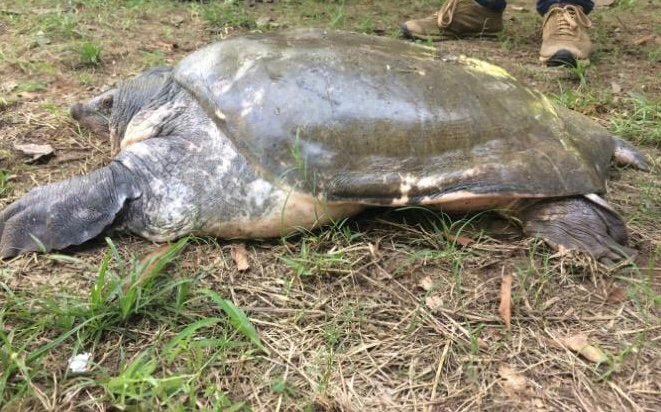Wokha is not known for its high population of softshell turtles as no proper research had been done till now, but species like Indian Softshell Turtle, Peacock Softshell Turtle are found and now a very rare turtle called Black Softshell Turtle. All three are known to be globally endangered species.
While Indian Softshell and Peacock Softshell Turtles fall under the vulnerable category of the International Union for Conservation of Nature (IUCN) threat list, the Black Softshell Turtle falls under Critically Endangered category.
Nagaland Tribune, in our quest to look into the different species of turtles found in the district, stumbled upon Lansothung Lotha, Range Officer, Doyang Beat under Wokha Forest Division, the man who rescued a Black Softshell Turtle in 2016 with the assistance of Steve Odyuo, a wildlife conservationist and leader of NGO, Natural Nagas.
We could not resist asking Lansothung to retell the fascinating story of how he helped find the species of turtle that was declared ‘Extinct in the Wild’ by IUCN since 2002.
Download Nagaland Tribune app on Google Play

The story goes like this, in 2016, when he was posted as Range Forest Officer attached to Kiphire Wildlife Division, Nagaland, Lansothung came across an image of a turtle being circulated on WhatsApp where he felt that the evidence from the image of the turtle was not similar to the more common relatives such as peacock softshell turtle. So, with high chances of it being the Black Softshell Turtle, the Range Officer decided to investigate further and collecting information of when and where it was captured, and he was also worried if it was still alive. He then contacted Steve Odyuo for assistance, and they successfully rescued the Black Softshell Turtle alive.
The turtle was sent to Nagaland Zoological Park in Dimapur from where the DNA of the turtle was sent to Bangalore to confirm its species. The result back positive on 20 March 2017.

Lansothung Lotha, Range Officer, Doyang Beat under Wokha Forest Division
The rescued Black Softshell Turtle was the first to be recorded for the species from Nagaland. It is only known to be found in captive condition in Bangladesh as well as in some temple ponds in Assam.
Since then, the turtle has been removed from the ‘Extinct in the Wild’ category with more reports of the species from other parts. The species is now listed as ‘Critically Endangered’ species.
Like any other species in an ecosystem, turtles play an important role in maintaining the ecological balance where they are found and one of their most significant ecological roles is that they are the top predators in places where they are found.
Softshell Turtles are known to prefer both running water as well as stagnant water bodies and hence, they are found in rivers, ponds as well as wetlands. They are also known for its sensitivity to pollution and will move away from water bodies that are polluted.
It had been mentioned that the main threats for turtles in the district are hunting and habitat destruction but especially coal mining has been reported as a serious threat not only to the Softshell Turtles but also all other aquatic organisms in the water bodies where polluted water from coal mines flow into.
It is also known that the forest department had carried out habitat assessment studies in 2021 for softshell turtles in the district as well as taken the initiatives in making efforts to create awareness amongst the public for protection and conservation of the reptiles. The location of the habitats however has not been disclosed to protect the turtles.

The Black Softshell Turtle that was rescued in 2016 from Wokha district, Nagaland
According to forest department, to see the lasting impact of the conservation works, more efforts need to be concentrated. It is known that local communities are cooperating so far although conservation effort for turtles is at a very nascent stage.
According to the Range Officer, participation of local communities in protection of the turtles is the key to conserve them in their natural habitats and also requires immense efforts to regulate all activities threatening the wetlands and other water bodies which are the habitats for these globally threatened.
Lansothung feels that in order to protect the species, it is crucial for all the local populace to participate in protecting the species, and moreover the need for conservation has to come from within the community.
This is even more meaningful considering that more than 88 per cent of the Forest areas in the State come under the ownership of the local communities and not the government. This is not only for the turtles but for the conservation of all other species.

Doyang riverside (PC: Wokha.nic.in)
When asked what initiatives it has taken since the discovery, the forest department stated that they had done some plantation works for habitat improvement, the habitat study, and awareness programs in and around Wokha district.
Wokha district, also known as land of plenty, is situated in the mid-western part of the Nagaland state in India which is the home of the Lotha Nagas. It is a place where Lothas counted heads before spreading out into villages during the waves of migration.
The District is surrounded by hills and ridges which makes it a hotspot for tourism. Doyang hydro project, Tiyi Mountain, Doyang River etc is a good place for tourism in the District of Wokha.

